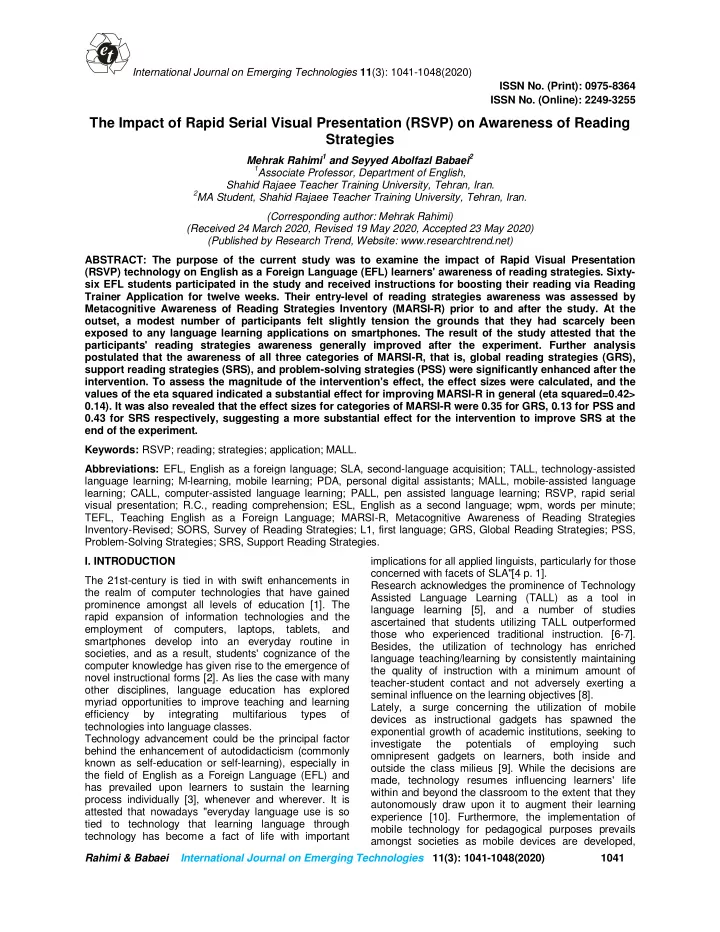

e t International Journal on Emerging Technologies 11 (3): 1041-1048(2020) ISSN No. (Print): 0975-8364 ISSN No. (Online): 2249-3255 The Impact of Rapid Serial Visual Presentation (RSVP) on Awareness of Reading Strategies Mehrak Rahimi 1 and Seyyed Abolfazl Babaei 2 1 Associate Professor, Department of English, Shahid Rajaee Teacher Training University, Tehran, Iran. 2 MA Student, Shahid Rajaee Teacher Training University, Tehran, Iran. (Corresponding author: Mehrak Rahimi) (Received 24 March 2020, Revised 19 May 2020, Accepted 23 May 2020) (Published by Research Trend, Website: www.researchtrend.net) ABSTRACT: The purpose of the current study was to examine the impact of Rapid Visual Presentation (RSVP) technology on English as a Foreign Language (EFL) learners' awareness of reading strategies. Sixty- six EFL students participated in the study and received instructions for boosting their reading via Reading Trainer Application for twelve weeks. Their entry-level of reading strategies awareness was assessed by Metacognitive Awareness of Reading Strategies Inventory (MARSI-R) prior to and after the study. At the outset, a modest number of participants felt slightly tension the grounds that they had scarcely been exposed to any language learning applications on smartphones. The result of the study attested that the participants' reading strategies awareness generally improved after the experiment. Further analysis postulated that the awareness of all three categories of MARSI-R, that is, global reading strategies (GRS), support reading strategies (SRS), and problem-solving strategies (PSS) were significantly enhanced after the intervention. To assess the magnitude of the intervention's effect, the effect sizes were calculated, and the values of the eta squared indicated a substantial effect for improving MARSI-R in general (eta squared=0.42> 0.14). It was also revealed that the effect sizes for categories of MARSI-R were 0.35 for GRS, 0.13 for PSS and 0.43 for SRS respectively, suggesting a more substantial effect for the intervention to improve SRS at the end of the experiment. Keywords: RSVP; reading; strategies; application; MALL. Abbreviations: EFL, English as a foreign language; SLA, second-language acquisition; TALL, technology-assisted language learning; M-learning, mobile learning; PDA, personal digital assistants; MALL, mobile-assisted language learning; CALL, computer-assisted language learning; PALL, pen assisted language learning; RSVP, rapid serial visual presentation; R.C., reading comprehension; ESL, English as a second language; wpm, words per minute; TEFL, Teaching English as a Foreign Language; MARSI-R, Metacognitive Awareness of Reading Strategies Inventory-Revised; SORS, Survey of Reading Strategies; L1, first language; GRS, Global Reading Strategies; PSS, Problem-Solving Strategies; SRS, Support Reading Strategies. implications for all applied linguists, particularly for those I. INTRODUCTION concerned with facets of SLA"[4 p. 1]. The 21st-century is tied in with swift enhancements in Research acknowledges the prominence of Technology the realm of computer technologies that have gained Assisted Language Learning (TALL) as a tool in prominence amongst all levels of education [1]. The language learning [5], and a number of studies rapid expansion of information technologies and the ascertained that students utilizing TALL outperformed employment of computers, laptops, tablets, and those who experienced traditional instruction. [6-7]. smartphones develop into an everyday routine in Besides, the utilization of technology has enriched societies, and as a result, students' cognizance of the language teaching/learning by consistently maintaining computer knowledge has given rise to the emergence of the quality of instruction with a minimum amount of novel instructional forms [2]. As lies the case with many teacher-student contact and not adversely exerting a other disciplines, language education has explored seminal influence on the learning objectives [8]. myriad opportunities to improve teaching and learning Lately, a surge concerning the utilization of mobile efficiency by integrating multifarious types of devices as instructional gadgets has spawned the technologies into language classes. exponential growth of academic institutions, seeking to Technology advancement could be the principal factor investigate the potentials of employing such behind the enhancement of autodidacticism (commonly omnipresent gadgets on learners, both inside and known as self-education or self-learning), especially in outside the class milieus [9]. While the decisions are the field of English as a Foreign Language (EFL) and made, technology resumes influencing learners' life has prevailed upon learners to sustain the learning within and beyond the classroom to the extent that they process individually [3], whenever and wherever. It is autonomously draw upon it to augment their learning attested that nowadays "everyday language use is so experience [10]. Furthermore, the implementation of tied to technology that learning language through mobile technology for pedagogical purposes prevails technology has become a fact of life with important amongst societies as mobile devices are developed, Rahimi & Babaei International Journal on Emerging Technologies 11(3): 1041-1048(2020) 1041
Recommend
More recommend